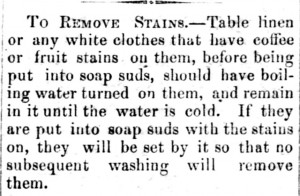In the mid-nineteenth century, many southern newspaper editors filled gaps in their issues with advice columns. These columns often took the form of proverbs that preached virtuous behavior. The editors also included agricultural instruction, housekeeping solutions, and advice on everyday living. Generally, they were written by the newspaper’s editor, but also included reprints from magazines and newspapers from around the country. Presented below is a compilation of advice columns from issues of Milledgeville’s Federal Union in 1868. These issues and many others can be found in the Milledgeville Historic Newspapers Archive. One last note: The advice is nearly one hundred and fifty years old, so please approach it with caution. There is no guarantee that peach leaves will cure your foot if you step on a nail.
Federal Union, July 14, 1868
Federal Union, September 8, 1868

Federal Union, July 14, 1868
Federal Union, May 12, 1868
Federal Union, July, 14, 1868
Federal Union, July 14, 1868
Federal Union, June 30, 1868









